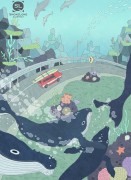One of the things I love about this piece is the boldness of the first sentence, which clearly states the dilemma of the child and the contradictory character of the mother. Is this a conscious tactic or did it evolve with the story?
Hmm… I’d say I began with a gut feeling, and I tried to use language that matched up with that feeling. On the one hand, the mother is sort of a monstrous figure because the story is so closely wedded to the perspective of the child, and on the other, she’s this fragmented, fragile, unbalanced, hurt person, and her child intuits that. The spoken line also sets the tone of the story—claustrophobia and engulfment and love, and how they’re inextricably linked in the world of this piece.
I appreciate, too, the way the story makes it difficult for the reader to judge the mother even as we fear for the well-being of the daughter. The mother says something I find pretty horrifying: “If I died you wouldn’t even know what to do with yourself.” And yet at the end of the story she attempts to make amends or to complete her statement when she calls to tell her daughter how much she loves her. Were you concerned that readers might write off the mother as somehow unfit?
Not at all. I was concerned with making her feel nuanced and human. I absolutely wanted her to be a scary, depressing figure, but I didn’t want her to operate as a cliché. Most parents do their absolute best when it comes to taking care of their kids, and I think it’s so much more interesting to explore that, to explore where someone’s best—and love—does and doesn’t fall short, rather than to castigate someone for being an unskilled parent or a sick person. My goal is to write characters complicated enough to generate complicated readerly responses.
With what/how did this story begin? Is there a moment or image that made you think you were really onto something?
My stories almost always begin with a feeling that I can only describe as somewhere between an itch and a crush. There’s an element of desire that’s really hard to articulate, but it’s what keeps me coming back to a particular scenario or scrap of dialogue or image. I develop an attachment to one of these things—or a combination—as I’m writing, and I worry at them with other pieces of language until the “thing” starts to turn into a real piece. There were a few moments that acted in this lodestar way as I moved through this piece: the first line, the brief scene at the table with the mashed potato breakfast, and that line about the plum tree in the yard. A lot of the rest of the piece is connective tissue, which I wrote to get from one of these moments to the others, to see how they were connected.
When/how did you know it was going to be a flash?
To be honest, I’m not really so into the term “flash.” I prefer to say that I write short prose and leave it at that. I’m not a big believer in genre distinction, and I think “flash fiction” implies that there are stark boundaries between fiction, poetry, and nonfiction. I much prefer writing that transgresses boundaries of all kinds, including the ones that exist between genres.
I’m writing a collection of very short prose pieces—usually around 700 words—and this was one of them. I think my work has always been pressing towards brevity, but it’s only recently that I’ve really decided to trust my gut and go for it. I used to smash a few short short pieces together and call it a short story or bloat a perfectly acceptable piece with lots of superfluous language/scenework in order to fulfill some criteria I had in my head about what makes a short story. Sometimes this worked out all right, sometimes it didn’t. I like to write about luminous moments in everyday life, scenes that are tinged with a sort of pre-cognitive knowing that something is happening—the characters just can’t quite articulate what that something is. I think a very short form is suited to portraying those moments.
Obviously, the writer of flash has to leave out more than she includes. What’s your guiding principle for managing these decisions regarding inclusion and omission?
What a hard question! Really my guiding principle, as I’ve alluded to already, is an instinctual feeling, a gut reaction. I tend to work on these little pieces for many weeks, though it’s less of a writing and paring down and more of a writing and deleting and then writing and deleting and rearranging process, which makes me a really slow writer (and now that I think about it, I’m sure this has something to do with why I write such short pieces). There’s a pressurizing aspect to writing in this way that compresses the language.
What gave you the most trouble in writing this story?
I was terrified that the story would come across as emotionally prurient or pornographic in some way. I didn’t want people to think that I was writing about this scenario in order to generate pure pity or pure revulsion—that’s part of why I felt so committed to acknowledging the mother as a character who embodies pain and anger but also immense love. And that was hard. It was hard to strike a balance when it came to the information I included about either character. Where did I want the reader’s focus to be? When I’ve been working on a piece for a long time, I tend to vacillate between thinking “Oh, this is just over the top and I should cut it” and wondering “Is this too subtle? Do I need to add another line or beef up the language in some way?” Often the hardest part of writing is trusting myself, giving myself permission to execute the story in the way that I feel is best.



 The SmokeLong Grand Micro Contest (The Mikey) is now an annual competition celebrating and compensating the best micro fiction and nonfiction online.
The SmokeLong Grand Micro Contest (The Mikey) is now an annual competition celebrating and compensating the best micro fiction and nonfiction online.